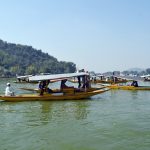Tourism marketing plays a pivotal role in positioning the tourism product amongst the right segment that has a demand for it .Targeting the right segment and proving to be apt in terms of service delivery is the key towards the successful promotion of the product.Heritage tourism operates through its cultural moorings and sensitivities that shape the perceptions of the tourists towards the heritage. Identification with the particular heritage and satisfying the cultural moorings should have the basis for marketing heritage tourism. Heritage as the expression of innovations acquiring the landscape in space and time has an impact on both heritage tourism marketers and the heritage management professionals.It is a diverse form of tourism that requires a multidisciplinary approach to yield sustained dividends. It is not just a type of tourism but a tool that has the tendency to harmonize the relations between various segments of the society. No doubt economic benefits are the primary objectives kept in mind by the marketers but at the same time it acts the glue and catalyst that binds social groups of diverse types in one single thread. It is type of tourism that demand introspection on the part of both tourists and policy makers.Not to forget the role of the heritage tourism professionals and the conservation management experts who are basically the heritage management professionals. The various stakeholders have a role to play. It can be best described as the application of the concept of co creation where product is developed by the inputs from the consumers. In which, the voice of the consumer is always given primacy. The great thing about heritage tourism is that people are not only curious about their own heritage but develop inclination for the other people’s heritage.That is why international organization as argued elsewhere project heritage as the shared and common heritage of humanity depicting the continuous journey of evolution to seek spiritual solace embedded in culture .The element of sanctity associated with heritage tourism makes it a positive domain for the developmental activities in the destination area that has heritage assets. Religious heritage has community involvement But the sensitivity linked with religious heritage makes it a political imperative for the policy makers to deliver the infrastructural facilities in the destination area that include roads, electricity supply and water supply. As the negligence on the part of the decision makers may cost them the vote bank whose sensitivities are linked with heritage asset.It makes heritage a sensitive issue. Besides being the high profile tourism product it is the most vulnerable in terms of the expensive and high cost of the heritage items like idols, miniatures, instruments, weapons and jewellery that is traded through illicit activities.Thus it has prompted many nations to implement the antiquity laws to deter the smugglers from trafficking the heritage assets across the national borders and the state jurisdiction.These factors have shaped the policy making paradigm in the public domain internationally.Product differentiation is the outcome of the usage of heritage preservation and conservation that acts as tool to keep the demand of the upscale tourist in the mind.As heritage tourism is the niche area that is the segment dominated by the educated class of the society having an insight of its cultural moorings and realization of the heritage value of the assets.What makes heritage tourism a specialized type is that it is divergence from mass tourism of 1960’s and 1970’s.the inter reacted economic developments in the world have converted a large chunk of mass tourists into new tourists and this new class refers to sustainable tourism having the element of responsibility.It is basically the diversification of tourism and reflects the maturity of the sector more towards specialized tourism; where heritage tourism stands at first rank.
Heritage Tourism Marketing

Sign Up For Daily Newsletter
Be keep up! Get the latest breaking news delivered straight to your inbox.
By signing up, you agree to our Terms of Use and acknowledge the data practices in our Privacy Policy. You may unsubscribe at any time.
Leave a Comment Leave a Comment
Stay Connected
Latest News
Recent Posts
- Jhelum Swells: Water level rises above danger mark at Sangam, Pampore; RM Bagh enters warning zone in Sgr
- Joint Review Meeting On Flood Preparedness and Contingency Held at PCR Kashmir
- Inclement Weather: Health department on high alert in Kashmir
- Relief from heavy rainfall expected by evening: Div Com Kashmir
- WFP sends emergency aid to quake-hit Afghanistan







